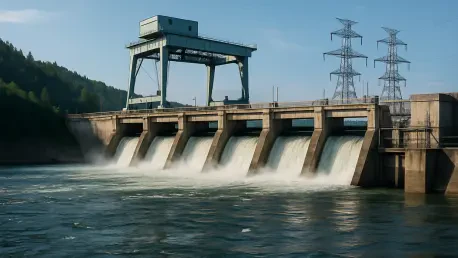The renewable energy sector continues to gain momentum as an integral part of the global transition to sustainable energy sources. With its dynamic landscape, the industry sees technological innovations and strategic collaborations that shape its future. Significant players like Hydro-Québec and Newfoundland and Labrador Hydro contribute to this evolution through partnerships focused on harnessing hydroelectric power. Their joint efforts on the Gull Island Project are set to enhance the scope of sustainable energy, marking a pivotal move in Labrador’s renewable energy journey.
Overview of the Renewable Energy Sector
The renewable energy sector has become an essential component of modern energy systems, with a robust growth trajectory in recent years. This industry’s significance lies in its potential to reduce carbon emissions and diminish reliance on fossil fuels. Key segments include wind, solar, and hydroelectric power, alongside emerging areas such as tidal and geothermal energy. The sector’s expansion is underpinned by technological developments, government incentives, and a growing base of environmentally conscious consumers. Regulatory frameworks have nurtured these advancements, setting standards and promoting clean energy transitions.
Technological innovations wield considerable influence over the sector, enabling more efficient energy capture and storage. Significant players like Hydro-Québec, operating within regulations, are pushing the boundaries of what is possible in renewable energy. Additionally, industry regulations define market practices, ensuring safety, reliability, and environmental protection. This landscape creates a dynamic arena for energy companies to explore and expand their offerings in renewable technologies.
Trends and Technological Advancements in Renewable Energy
Key Trends Driving the Sector
Renewable energy is advancing rapidly due to key trends, including technological improvements and increased consumer demand for sustainability. Innovative technologies like advanced solar photovoltaic systems and wind turbines increase efficiency and decrease costs. Social and political pressures are driving governments to support renewables, resulting in more incentives and favorable policies. These trends create expanded markets and opportunities for key players like Hydro-Québec and partners in projects like Gull Island.
Changing consumer preferences towards cleaner energy solutions are impacting market dynamics. This shift, alongside progress in energy storage technologies, opens new avenues for the integration of renewable sources into existing energy grids. Companies in this space are exploring cutting-edge solutions to meet demand while minimizing environmental impact, focusing on decentralized energy systems and improved grid flexibility.
Market Analysis and Future Projections
The renewable energy market is poised for significant growth, with projections indicating substantial increases in deployment. Indicators such as investment figures and adoption rates underscore a robust market performance, driven by increased demand for cleaner energy alternatives. Forward-looking data suggests that renewable energy will constitute a larger portion of the global energy mix, driven by technological improvements and government-policy support.
The industry is expected to expand as more countries commit to reducing their carbon footprints, further stimulating growth in renewable capacity. As consumers and businesses adjust to increased energy costs, coupled with the appeal of sustainable sources, sectors like hydroelectric power are anticipated to play a critical role. The continual evolution of storage solutions and energy management systems enhances the sector’s capability to meet future demands efficiently and reliably.
Challenges Facing the Renewable Energy Industry
The renewable energy industry faces various challenges that could hinder its growth trajectory. These include technological constraints such as insufficient energy storage solutions, which can affect the reliability of renewable energy. The industry is also subject to market fluctuations and economic pressures, potentially impacting investment flows and project viability.
Regulatory challenges present additional hurdles, with compliance often requiring significant resources. Navigating complex approval processes and maintaining adherence to stringent environmental standards are essential yet challenging tasks. Companies must adapt by leveraging innovation, forging strategic partnerships, and employing new business models to address these obstacles effectively.
Regulatory Environment and Compliance in Renewable Energy
The regulatory environment in the renewable energy sector plays a vital role in shaping industry practices. Comprehensive regulations, including laws and standards, govern aspects such as environmental impact, safety, and grid integration. These measures ensure renewable projects comply with national and international standards while promoting broader adoption.
Staying compliant with evolving regulations demands proactive strategies and robust internal frameworks. As security measures become paramount, companies must invest in systems that safeguard data and ensure operational resilience. The global emphasis on sustainable energy necessitates that industry leaders adhere to increasingly rigorous compliance mandates, fostering a stable and trustworthy market environment.
Future Directions in Renewable Energy
The renewable energy industry is headed toward stronger stakeholder collaboration, technological innovation, and increased adoption of integrated energy solutions. Emerging technologies like artificial intelligence and the Internet of Things offer transformative potential, optimizing performance and reducing inefficiencies. Companies are also exploring material advancements that promise higher efficiency rates and lower production costs.
Potential market disruptors, including advancements in battery technology and energy management systems, are likely to reshape the landscape. As renewable energy becomes more embedded in everyday life, consumer preferences will continue to lean toward sustainable choices. Future growth areas will focus on maximizing efficiency and integration across different energy systems, driven by both market demand and regulatory imperatives.
Conclusion and Industry Outlook
The renewable energy sector’s trajectory, marked by technological advancements and strategic collaborations, suggests a vibrant future. Partnership initiatives, exemplified by Hydro-Québec and NL Hydro’s Gull Island Project, showcase the potential for industry alliances to accelerate renewable energy development despite past obstacles. As technologies advance and regulatory landscapes evolve, the renewable energy industry is poised for sustained growth and innovation.
Strategic investments in emerging technologies and innovative business models will likely drive future successes. Industry leaders must remain agile in navigating potential challenges while seizing opportunities for expansion. A steadfast focus on integrating sustainable practices and leveraging technological advancements will ensure that renewable energy continues to play a crucial role in the global energy paradigm.









